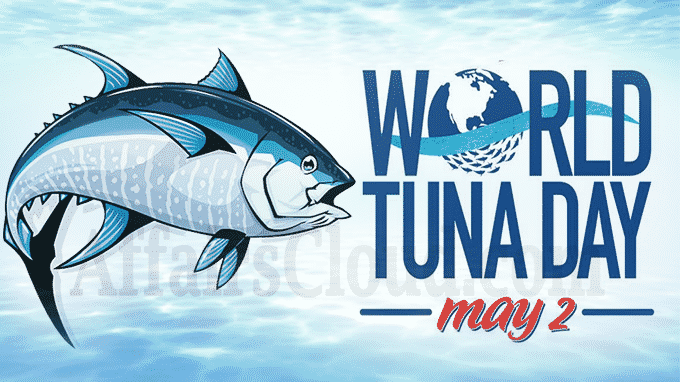World Tuna Day is observed on May 2 every year. The United Nations (UN) established the World Tuna Day to raise awareness about the tuna fish and its importance to humans and earth. The day is observed to promote more sustainable fishing practices. Key Points:
Key Points:
i.History of the day: In December 2016, the United Nations General Assembly voted to officially observe the World Tuna Day in its resolution 71/124 and the day was observed for the first time in 2017.
ii.About Tuna: Tuna and tuna-like species are very important economically to both developed, developing countries and a significant source of food. They include approximately 40 species occurring in the Atlantic, Indian and Pacific Oceans and in the Mediterranean Sea.
iii.Nutritional properties: Tuna fishes are rich in Omega-3, also contains minerals, proteins, vitamin B3, vitamin B12, vitamin D, Selenium and phosphorus.
iv.The 2 main products of drive tuna production are traditional canned tuna and sashimi/sushi. These products demonstrate relevant differences in terms of the species utilized, quality requirements and production systems.
v.Many countries depend heavily on tuna resources for food security and nutrition, economic development, employment, government revenue, livelihoods, culture and recreation to reach and work out “Goal 14: Conserve and sustainably use the oceans, seas and marine resources from the SDG (Sustainable Development Goals)”.
vi.Approximately 7 million tonnes of tuna and tuna-like species are harvested yearly. These migratory tuna species account for 20 percent of the value of all marine capture fisheries and over 8 percent of all globally traded seafood.
vii.The UN Food and Agriculture Organization (FAO) notes that market demand for tuna is still high, and that the significant overcapacity of tuna fishing fleets remains. In its latest report from 2018, FAO registered that combined catches of tuna and tuna-like species levelled off at around 7.5 million tonnes in 2016 after an all-time maximum in 2014 (7.7 million tonnes).
viii.At present, over 96 countries are involved in the conservation and management of tuna that has an annual value of almost 10 billion USD (United States Dollar) and some FAO relevant programmes have started giving positive results in reducing overfishing.
About Food and Agriculture Organization (FAO):
Headquarters– Rome, Italy.
Director-General– Qu Dongyu.




